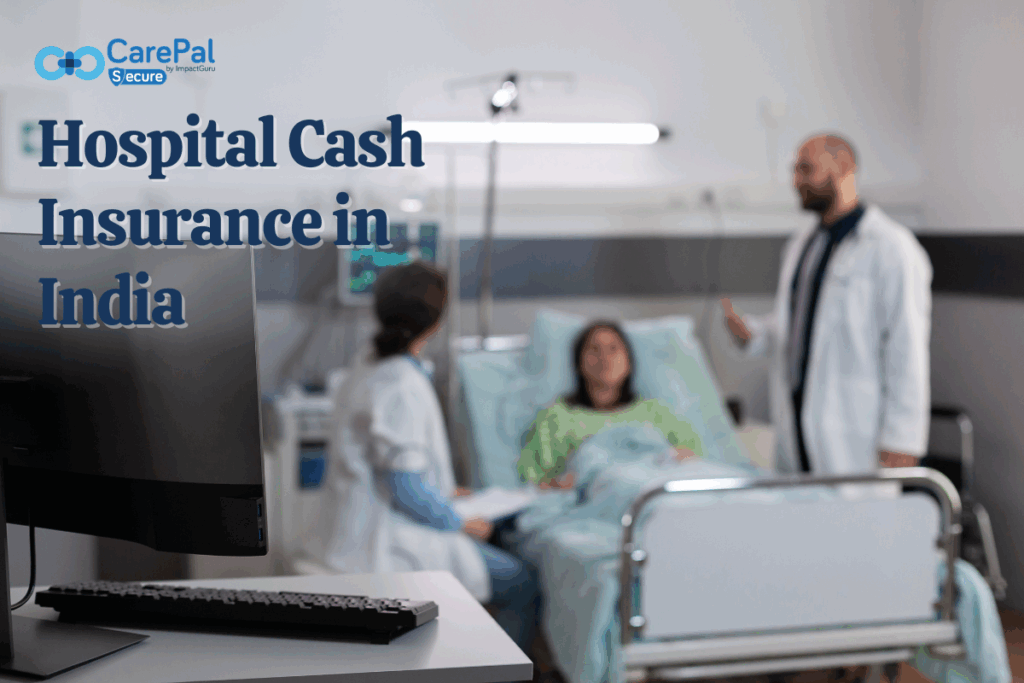Hospital Cash Insurance in India: Is It Worth It Even If You Already Have Health Insurance?

A solid health insurance plan can give you peace of mind during medical emergencies. But anyone who’s been hospitalized knows that the treatment bill isn’t the only cost to worry about. Expenses like missed work, extra nutrition, post-discharge care, or even food and travel for caregivers can add up—and most of these are either not covered or only partially covered by regular health insurance.
That’s where Hospital Cash Insurance—also known as Daily Hospital Cash Benefit or Hospicash—steps in. Unlike regular indemnity-based insurance that reimburses bills, hospital cash insurance offers a fixed daily payout for each day you’re hospitalized, regardless of your actual expenses. It’s designed to help you manage incidental and non-medical costs during a hospital stay.
In this article, we’ll explore what hospital cash insurance is, why it’s useful even if you already have health insurance, who it’s ideal for, and the pros and cons you should know before buying.
Why Hospital Cash Insurance Is Useful
Standard health insurance covers direct treatment costs—like surgeries, doctor fees, diagnostics, medicines, and room charges. Some policies even extend limited coverage to pre- and post-hospitalization care. But they usually don’t cover day-to-day expenses such as:
- Meals for attendants or caregivers
- Travel costs for family members
- Parking, accommodation, or phone bills near the hospital
- Babysitters or domestic help during your hospital stay
- Uncovered accessories like braces, crutches, or nebulizers
Hospital cash insurance gives you a pre-decided daily allowance when you’re hospitalized. This payout is over and above your main insurance and can help offset those everyday costs that aren’t reimbursed. It’s especially valuable for self-employed individuals or those with irregular income, where each day away from work means a financial loss.
When Does Hospital Cash Insurance Pay?
Hospital cash policies have a simple structure. They provide a fixed amount per day during hospitalization, often without needing detailed bills. Here’s how they typically work:
- The insured must be admitted for at least 24 hours
- Daily benefit ranges from ₹1,000 to ₹5,000 (as per the plan)
- The benefit may be capped at 30 to 90 days per policy year
- In case of ICU admissions or surgeries, the payout may double
- Waiting periods may be waived for accident-related claims
To claim, you generally need only the hospital admission and discharge summaries—no itemized bills required.
When Won’t It Pay?
Despite being straightforward, hospital cash insurance does have exclusions. Most policies won’t pay if:
- The treatment is OPD-based or done as day-care
- Hospitalization is less than 24 hours (unless specifically allowed)
- It’s for cosmetic or elective surgeries (e.g., Botox, hair restoration)
- It involves pre-existing conditions within the waiting period
- The hospitalization is outside India, for domestic plans
- It’s related to maternity, unless explicitly included
As always, check the policy document or speak with your insurer to understand all exclusions.
Who Should Consider Hospital Cash Insurance?
While optional, hospital cash insurance is particularly useful for:
- Self-Employed and Small Business Owners: Every missed workday is income lost. Since they don’t have sick leave, hospital cash helps replace that gap.
- Senior Citizens: Older adults tend to have longer hospital stays. This benefit supports costs like attendant care and extra support post-discharge.
- Families on Employer Health Plans: Most corporate group policies have room rent caps and don’t cover incidental expenses. Hospicash can fill those gaps.
- High-Risk Professionals or Lifestyle Segments: Those prone to accidents or with chronic health issues benefit from an extra layer of support.
- Working Professionals with Dependents: If you or a family member needs help during recovery—like hired caregivers or unpaid leave—this insurance can ease the financial pressure.
- Residents in Semi-Urban or Rural Areas: Hospitalization may be affordable, but travel and lodging costs can spike. Daily payouts help cover those.
Pros of Hospital Cash Insurance
- Covers Non-Medical and Incidental Costs
- No Bills Required
- Protects Your No Claim Bonus (NCB)
- Low Premiums
- Additional Benefit for ICU or Accidents
- Tax Benefits
Cons of Hospital Cash Insurance
- Fixed Payout Regardless of Actual Cost
- Coverage Limits
- Waiting Periods Apply
- Limited Availability as a Standalone Product
- Policy Exclusions
Questions to Ask Before Buying
- What’s the daily benefit amount? Can it be customized?
- Is there a higher benefit for ICU or accident-related stays?
- How many days of hospitalization are covered per year?
- Are daycare treatments or maternity included?
- What’s the claim process—online, app-based, or manual?
- Can it be bought standalone or only as an add-on?
- What are the waiting periods and exclusions?
Should You Buy Hospital Cash Insurance?
That depends on your lifestyle and how comprehensive your current health policy is. If your health insurance already covers most non-medical costs, or if you’re financially secure during hospitalizations, it may not be essential. However, if you’re self-employed, part of a family dependent on a single income, or you simply want extra financial support during hospital stays, hospital cash insurance is a smart, affordable supplement.
Conclusion
Hospital cash insurance isn’t a replacement for traditional health insurance—it’s a strategic add-on. It fills an often overlooked gap: non-medical and incidental expenses during hospitalization. With simple claim processes and low premiums, it’s a practical tool to cushion the financial impact of medical emergencies. We recommend considering it as part of a holistic health insurance strategy. But before you buy, review your existing coverage, check the daily benefit structure, and ensure it matches your needs. Like all insurance, the true value of Hospicash lies in understanding it well and choosing wisely.

Omprakash Lanjewar is passionate about making health insurance simple and accessible. With a background in finance and strategy, he shares clear, practical insights to help readers navigate their insurance choices. Outside of work, Omprakash enjoys swimming, cycling, and staying connected with industry trends.












